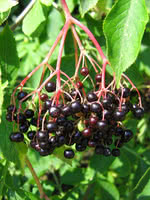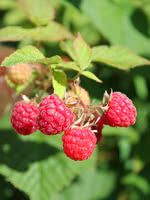Mon-Fri 9am - 5pm Mountain time
Black Elderberry vs Red Bounty Raspberry
Sambucus canadensis
Rubus x SK Red Bounty
NOT AVAILABLE THIS SEASON - MIGHT RETURN
NOT AVAILABLE THIS SEASON - MIGHT RETURN
Black Elderberry is a deciduous shrub native to eastern North America. You can plant this shrub in moist areas and it will help stabilize your soil. You can also use it on rural properties anywhere you'd use a lilac.
Black Elderberries are considered to be partially self-pollinating. So while they will still produce some berries without cross-pollination, planting with another variety will increase yields. Consider planting with Ranch Elderberry or Bob Gordon Elderberry.
Warning: the seeds, stems, leaves, roots, and uncooked berries of the Black Elderberry are poisonous to humans when eaten in quantity. You should cook the berries to make them safe for human consumption.
Red Bounty Raspberry is a hardy, self-fertile variety that produces large, red berries with great taste ideal for preserves, jam, and fresh eating. Red Bounty Raspberry stands on its own - no trellis required.
The Red Bounty Raspberry is a fast-growing floricane. This means that raspberries will not grow on canes the year they first grow. The mature canes they do grow on, however, produce more berries than primocane varieties.
Black Elderberry Quick Facts
Red Bounty Raspberry Quick Facts
Toxicity: leaves, stems, and uncooked berries are poisonous to humans

